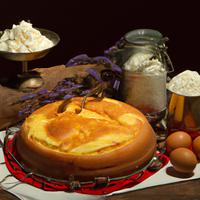
1 serving (125 grams) contains 350 calories, 10.0 grams of protein, 22.0 grams of fat, and 25.0 grams of carbohydrates.

Log this food in SnapCalorie

Nutrition Information
Calories |
665.4 | ||
|---|---|---|---|
% Daily Value* |
|||
| Total Fat | 41.8 g | 53% | |
| Saturated Fat | 22.8 g | 114% | |
| Polyunsaturated Fat | 0 g | ||
| Cholesterol | 152.1 mg | 50% | |
| Sodium | 380.2 mg | 16% | |
| Total Carbohydrates | 47.5 g | 17% | |
| Dietary Fiber | 0 g | 0% | |
| Sugars | 34.2 g | ||
| protein | 19.0 g | 38% | |
| Vitamin D | 38.0 mcg | 190% | |
| Calcium | 285.2 mg | 21% | |
| Iron | 1.9 mg | 10% | |
| Potassium | 228.1 mg | 4% | |
* Percent Daily Values are based on a 2,000 calorie diet. Your daily values may be higher or lower depending on your calorie needs.
Food Attributes
Source of Calories
About Ricotta cheese cake
Ricotta cheesecake is a creamy, indulgent dessert rooted in Italian cuisine, celebrated for its light texture and subtle flavor. Made primarily with ricotta cheese, eggs, sugar, and flour, it stands apart from traditional cream cheese-based cheesecakes due to its lower fat content and slightly airy consistency. The ricotta lends a mild, naturally sweet profile and a good source of protein and calcium, contributing to nutritious benefits. Often enhanced with citrus zest, vanilla, or almond flavoring, its delicate sweetness pairs beautifully with fresh fruit toppings. While it contains essential nutrients, ricotta cheesecake can still be calorie-dense due to added sugars and fats. Portion control is recommended for those watching their caloric intake, but it is a delightful treat that balances a touch of indulgence with wholesome ingredients inspired by Mediterranean traditions.



